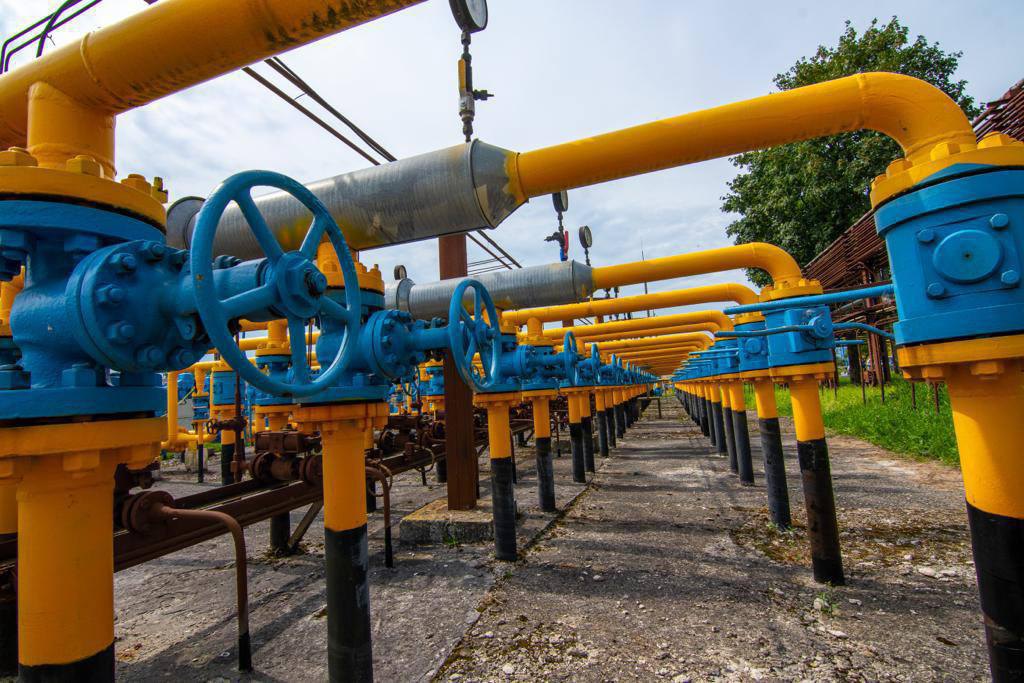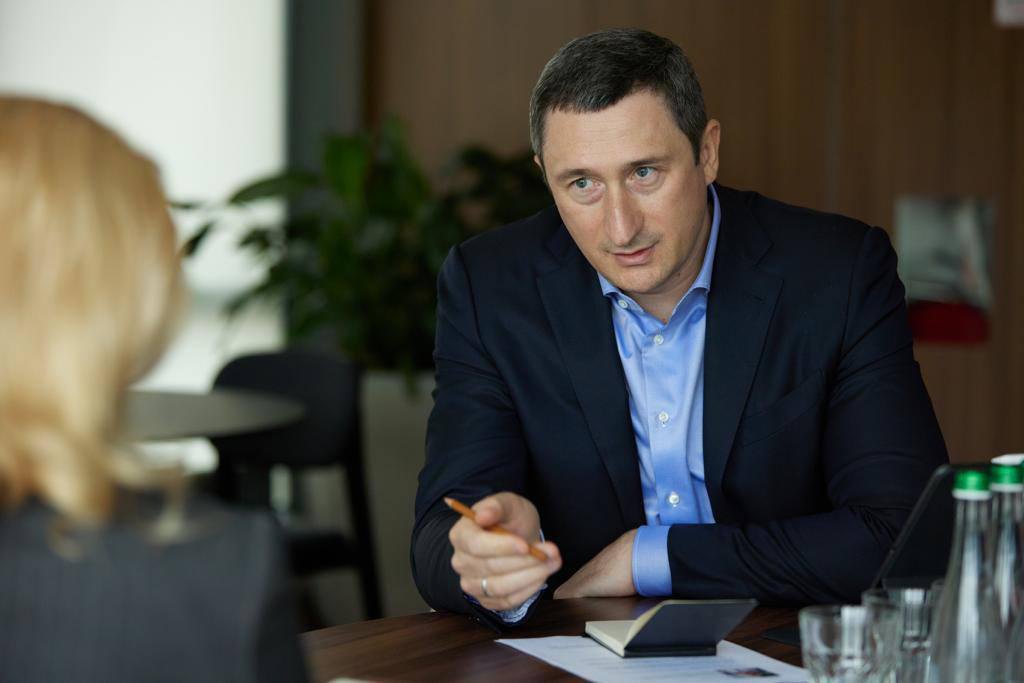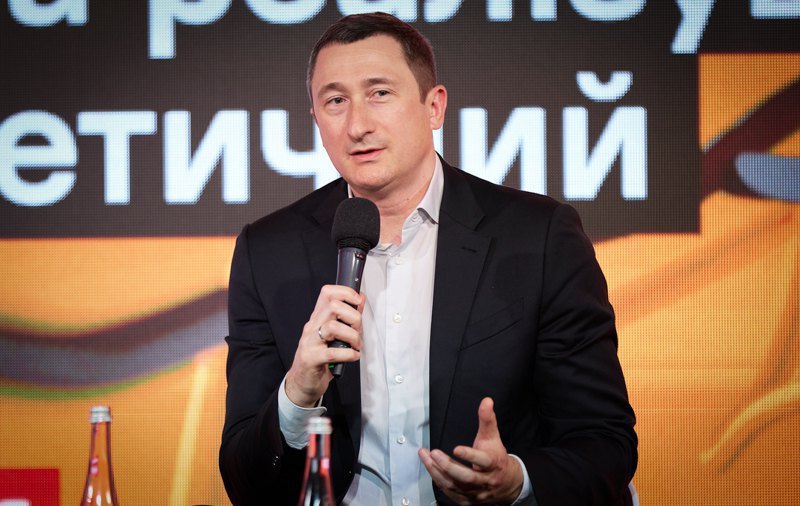
Naftogaz has already surpassed its gas stocking target
The heating season is about to start. One of the main questions on everyone's mind is whether we have enough gas to get us through the winter.
Today is 10 October, and we still have time before the so-called heating season begins. This year, the Ukrainian government has set a target of accumulating 14.7bn cu.m.
Naftogaz has even exceeded the plan. Today, we already have 15.75bn cu.m. of gas. And by winter, we expect to cross the 16bn cu.m. mark. Is this enough? Because figures in billions of cubic metres are not always clear to people. I must assure you that these figures are absolutely sufficient to get us through the winter with confidence. We will also continue our own gas production.
Compared to last year, are these figures higher?
At the beginning of winter last year, we reached the level of about 14bn cu.m. of gas. That is, we have now accumulated much more than last year.
What made it possible?
There are two components. The first and most important one is the increase in Ukrainian gas production. Thanks to Naftogaz Group, it has been gradually growing. We have reached the +7% mark compared to the previous year. I should also note that we managed to provide conditions and facilitate production by private companies that could not export free resources. Naftogaz entered the purchase market to enable these companies to produce and remain liquid.
The second factor is the additional volume of gas stored by non-residents. We managed to attract them, which is an important result.
According to the Razumkov Centre, about 2bn cu.m. in storage is gas owned by foreign companies. And the state will not be able to dispose of it during the heating season. So Ukraine still has to import fuel?
According to our estimates, if the situation does not deteriorate, we will be able to cover the heating season using our own resources. That is why we do not plan to use that volume in storage: storage service is our business, which we provide to international customers, European traders. And it is very good that it exists.

This year we managed to increase these volumes to 2bn cu.m., which is a plus. This is the economy, our profit. It also means additional technical pressure in the storage facilities. But most importantly, it is an indicator of trust in us. The reality is such that during military aggression and martial law, international traders pump gas into Ukrainian storage facilities. And without any additional insurance mechanisms, relatively speaking, the way it used to be. Therefore, this is an absolute commercial trust that we have managed to build.
How profitable is it to store gas from foreign companies in storage facilities?
Gas storage is not only a matter of profit, but also of secure supply, reserves and volumes. Of course, there is also a commercial component that relates to potential spreads, i.e. the difference in prices in summer and winter. That is why the market is now motivating non-resident traders to store gas, particularly abroad. We understand that underground storage facilities in Europe are almost full. Therefore, non-residents use ours.
The Cabinet of Ministers has allowed imports of gas from Moldova and the EU without certificates of origin. Is there a risk that fuel from Russia could enter Ukraine in this way?
Some time ago, the European Union set a clear course to abandon Russian gas and is gradually moving towards this: the process is planned to be completed by 2027. We are working with the majors, the main European traders, in fact, with the largest companies involved in this. Therefore, I would not expect any Russian gas.
Russia is constantly threatening to stop gas transit ahead of schedule. If this happened during the cold period, would Ukrainian consumers be supplied with gas? What would be the consequences? Especially during the period of minimal storage reserves in February and March?
Ukrainian consumers will be supplied with gas, regardless of the share of transit. Our reserves are absolutely sufficient. If you are asking whether this transit has anything to do with replenishing our reserves, then this is certainly not the case. We have not consumed Russian gas since 2014. In fact, up to that point, we had been compensating for the difference in consumption with imported gas. This year, as I have already said, we are counting on the Ukrainian resource. Therefore, there is no correlation between transit and our consumption.

Will Russian gas remain a kind of additional weapon against the whole of Europe this winter?
We have understood for many years that Russia has been using any energy, including natural gas, as a weapon. Perhaps European countries realised it too late that cheap gas comes with a certain additional price. And this price is not only economic. In fact, it is too high. Sometimes it is the price of independence and political influence on countries. So yes, Russian gas is a weapon, a tool of manipulation.
Is Europe ready to stop Russian gas supplies?
As I said, today Europe is to some extent dependent on Russian gas. There are several limited channels of access and supply to the European Union. But this component is actively decreasing. We see that every year European countries reduce this share. However, gas is still being supplied. You have to understand that there are certain countries, the so-called landlocked countries, that have no access to the sea. They traditionally depend on Russian gas. And this issue must be resolved for them, otherwise they may face a real shortage of energy and natural gas. I am constantly focusing on this issue. It is in our interest that this is done as soon as possible.
Gazprom's revenues are declining, but oil is still a source of revenue for the Russian budget. And revenues from its exports are at least not declining. According to The Financial Times, Russia has managed to avoid G7 sanctions on a significant portion of its oil exports. Why have our partners failed to impose effective sanctions, and is it even possible?
I would not agree that our partners have failed to impose effective sanctions. Although I agree that they have not achieved the desired results in depriving our enemies of their income. However, we must admit that most of the sanctions are in place. Obviously, they need to be expanded. And this should be taken into account in the next sanctions packages.
In general, the revenues of the entire industry are declining. Russia today is to some extent deprived of opportunities. Some countries are completely dependent on Russian hydrocarbons, i.e. oil and gas. They cannot give up everything at once, otherwise they will not be able to exist. So Russia is taking advantage of this.

Naftogaz enhances security of its facilities
Russia continues to massively attack our energy infrastructure. How protected are Ukraine's gas storage facilities and ground infrastructure from missile and drone attacks? Because we hear very different estimates - from 7 to 80 per cent. This is a huge difference.
Yes, the aggressor is massively shelling our energy infrastructure, among other things. Of course, as the heating season approaches, such attacks are more likely to intensify. These can be various facilities: electricity, gas, oil and refineries. We see it, we feel it. This is not a matter of the future, it is a matter of the present. As for our subways and underground storage facilities, they are probably the most protected in Ukraine. At least because they are physically located at a depth of up to 3,000 metres. So the underground infrastructure is quite securely hidden.
Questions may arise about the ground infrastructure and distribution. Naftogaz is actively working on basic protection, the so-called passive protection. It takes a range of measures to protect ground infrastructure facilities. Of course, air defence is important in this. As we see, our defence capabilities are constantly growing.
How has the protection of the ground gas infrastructure been enhanced? What additional work has been done over the past year?
As I said, there is basic and complex protection. The basic one involves the use of protective structures, such as concrete slabs, big bags, gabions, and other things. The complex one involves anti-drone and jamming equipment. It also involves interaction with the Armed Forces and the National Guard where possible. There are also other things that I can't talk about in public.

Were all these measures implemented at the expense of international donors or Naftogaz?
What Naftogaz Group has done directly is at its own expense. And we will continue to do so. As for other external things, we have to be aware: Ukraine today is objectively dependent on external assistance. That is why, probably, part of this assistance was aimed at protecting our energy infrastructure. But as for Naftogaz, it has been using its own resources.
Can you share specific figures of howmuch Naftogaz has spent on enhancing the security of such facilities?
We will not disclose this information.
Could missile strikes cause massive gas cut-offs, for example, for entire cities or regions?
We cannot rule out that massive strikes could lead to this. Moreover, similar incidents have already occurred repeatedly last winter. Naftogaz Group employees were constantly working to eliminate the consequences of shelling in the regions. Just imagine, last winter, Naftogaz Group supplied natural gas to more than 200,000 customers in Donetsk Region. We were constantly repairing the networks.

It is clear that we are ready for such situations this winter. At the same time, the integration of regional gas companies is important. This process is almost complete: tens of thousands of specialists have joined efforts and will ensure the stability and reliability of gas distribution in all regions.
Regional gas companies associated with Dmytro Firtash are gradually coming under the control of Naftogaz. Previously, Ukrtransgaz has repeatedly complained about unauthorised fuel withdrawals by these companies. How is cooperation with regional gas companies changing?
Drastically, because regional gas companies are being integrated into Naftogaz Group. We have already integrated 16 of them. This covers most of natural gas volume and distribution in Ukraine, i.e. these are the largest regional gas companies. We will complete the process by the end of the year. This will actually allow us to ensure high-quality natural gas distribution and identify weaknesses. It will ensure stable supply right now, this winter.
"The winter will be colder, but not extreme. And we are ready for it"
How has the full-scale war affected the use of storage facilities? Do you have to pump more in western Ukraine?
Ukraine has the largest storage facilities in Europe. This is more than 31bn cu.m. Let's look at the map of our storage facilities (brings it up on the monitor). As you can see, most of them are located in the west of Ukraine. And very close to the border. These are our largest UGS facilities. So naturally, we have been using them and will continue to do so.

Due to the warm weather last year, the gas extraction period was shorter. As a result, we made some savings. Overall, the heating season went off without any major shocks. What are the main conclusions the company has drawn?
The previous heating season was very nerve-wracking for us. We were accumulating additional gas volumes over the winter, turning also to our international partners. At the beginning of winter, we managed to secure +1bn cu.m. of gas thanks to the support of the G7 countries and the EBRD. We are aware that objectively, the previous winter was quite warm. And when you say that we managed to save, I would not say that. Saving would mean taking energy-efficient measures. We spent less due to the climate conditions.
We are also preparing for this winter responsibly. Do we expect it to be colder? The winter will be colder, but according to forecasts, including international ones, it is not expected to be severe and extreme. Therefore, we are confident enough to enter the winter. And the need to save is a very important topic. For me, it is one of my priorities. Unfortunately, Ukraine is among the most inefficient countries in terms of energy consumption, particularly natural gas. And this has to change radically, it has to change urgently. There are two ways to do this. The first is the introduction of an energy market: it should cost as much as it does on the market, so that it is treated accordingly. The second (which should happen simultaneously) is the introduction of energy efficiency measures. It is very difficult to motivate investments in energy efficiency at the level of an enterprise (both small and large) when the price of energy, in particular natural gas, is regulated.
Therefore, I am confident that the measures aimed at implementing the energy market in Ukraine will reduce consumption directly and significantly. They will motivate energy-efficient projects and programmes. And in this regard, we have had access to European funding for years. But all this must happen simultaneously. That is, you cannot develop energy efficiency without letting go of the market. This is the situation.

"Despite Klitschko's warnings, the capital will have heating"
You assured us that we would get through the winter and that the population would be supplied with gas. However, Kyiv mayor Vitaliy Klitschko recently said that the heating season in the capital is under threat. Therefore, he will demand changes to the budget.
If we talk about compensation for the difference in tariffs, this is still an open question. And it has a certain history. I can assure you that Naftogaz is ready to provide all consumers with natural gas. And we have accumulated the required volumes for this. I would also like to note that the ultimate recipient of the difference in tariffs is actually Naftogaz itself.
Despite all these processes and some traditional politicisation before the start of the heating season, I assure our customers - and these are not only households, but also municipalities, cities, communities, and district heating companies - that we are actively concluding contracts for the supply of natural gas. We have already concluded most of them and are ready to ensure a stable winter in terms of volumes and our capacities. In Kyiv in particular.
Are you implying that Klitschko is playing politics with such statements?
It's hard to say whether there is politics involved. The issue of compensation for the difference in tariffs is objective, and it has been around for about two years. It needs to be resolved. However, I would like to emphasise once again that even under such conditions, Naftogaz is ready to operate and confidently get us through this winter.
International partners constantly emphasize the need to reform the energy sector. Let's talk about the package of priority reforms. What exactly is being done?
Yes, there is a lot of talk about this. And these are probably fairly objective conversations today. Ukraine has a future as a modern European state. And it has a chance to do so after certain internal changes. We need not only to defeat the external enemy. Using the example of the energy market reform, I want to emphasise how important it is to start right now. Perhaps without waiting for the war to end. Urgent reforms are a prerequisite for the country's further development. And the possibility to change the conditions for attracting private and foreign capital to this country.

In particular, in the letter on the need for reforms, the US again mentioned "liberalisation of the gas market". In what term is this realistic?
Liberalisation of the gas market or energy market reform, the introduction of an energy market is a necessary impetus for the development of the energy industry in the country, as well as accelerating energy efficiency measures and increasing energy efficiency. I am a huge supporter and driver of energy market reform and price liberalisation. Having a lot of experience in this area, I can say that the country needs this as much as air.
After all, what is preparation for the heating season if you remove the instrumental, technological and technical issues? This means equipment, repairs, other measures, replacement of pipes or equipment. However, everyone needs to understand that there is another component, which is sometimes even more important: the settlement of settlements, debts, compensation and other things. Historically, these arise as transitional issues from previous periods, as a result of regulated tariffs and the parties' inability to pay. Sometimes these are huge court cases. Therefore, when we talk about preparing for the heating season, we have to understand that it is not only technical, but also financial, legal, settlement and even political. We often have to find a solution to get this whole mechanism working when not all parties fulfil their obligations.
Therefore, only price liberalisation, only the energy market, can lead to the normal functioning of the system. I am convinced of this. Regarding possible criticisms of this idea from the opposition, such as "how will Ukrainian people pay European tariffs?". Firstly, our consumers will pay Ukrainian tariffs because it is a Ukrainian market and it has other components. Secondly, we must be absolutely clear that vulnerable people will receive appropriate subsidies, and this mechanism is already working quite well. So there is no need to be afraid. In my opinion, it is definitely bad when, for example, a person who should not receive cheap gas receives it anyway. All Ukrainians, regardless of their income, get cheap gas, you know? It's wrong.
International partners also insist that new members of supervisory boards of state-owned enterprises are needed. How important is it to meet these requirements?
This has already happened at Naftogaz at the beginning of the year. I am very proud of this. I believe it is a huge step in implementing corporate reform and promoting OECD principles. It adds transparency and professionalism. We have independent members of the supervisory board, experts with many years of relevant experience. And I think that in this regard, Naftogaz is an example of successful corporatisation. I fully support the logic of extending this practice to other state-owned enterprises, and we must do so urgently.
"Ukraine has the future as a powerbank for Europe"

LB.ua has recently launched the New Country project, where experts and politicians discuss Ukraine's recovery plans. In your opinion, which energy projects can be promising?
For the near future, these are energy efficiency projects and programmes. We have been talking about this for a long time. But only the introduction of the energy market will accelerate these programmes. They will become economically viable and commercially interesting for business.
Secondly, there is a strategic direction. And I am personally convinced that Ukraine has the future as a so-called powerbank for Europe.
That is, it is a country that produces a lot of energy. It can store it, and it is actually a reliable powerbank, an energy hub for Europe.
And these are natural gas storage facilities, which are already the largest. This is a matter of generating electricity of a different nature. In particular, wind power generation will be of great importance. It is also a matter of hydrocarbon production - both gas and oil.
That is why I am personally convinced that the energy sector in a reformed country (I emphasise reformed) has great prospects. It will become a key lever for the development of this country. And our task is to fulfil the condition for reforms right now, before the war is over. This moment has come. We have to do it.








